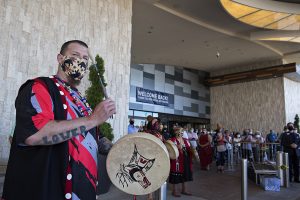What is it like to be Jewish? I hardly notice anymore. You might think I would, since I am a practicing Orthodox Jew, and my choices for where I live, how I dress, what I eat and where I send my children to school are all decided based on wanting to have enriched Jewish experiences for all of us. But it’s not like that. I don’t see the Jewish woman everyone sees from the outside. I am myself. I think and feel and go about my life.
Last Tuesday I went to an Al-Anon meeting at a church, and this is what I noticed: There was no code to enter the building. No entry pad, no buzzer, no secretary with a window that looks out over the door. I pulled the door handle and walked right into the wide lobby. There was no guard at a desk to take my name and ask why I was there, no paid security guard with a badge and a gun in a discreet holster.
I walked through the quiet, carpeted lobby, up a few stairs and down a hall to the meeting room. There were preschool students in the hall with their teacher, lining up for bathroom time. There was no steel double door between the preschool and the rest of the building. The middle-aged teacher didn’t look up from her students to see who was walking through. The students chattered and stood quietly in line.
I walked into the Al-Anon meeting and it was like all Al-Anon meetings. I was welcomed, the meeting was conducted and everyone was encouraged to take things “One day at a time,” and to “Keep coming back.”
When I left the church I noticed how there were no waist-high concrete bollards surrounding the entrance, no 11-foot-high metal fence meant to look decorative, but clearly very strong, solid and with triangular caps on the top to prevent climbing, around the playground. No sliding electric gate at the exit from the parking lot to close behind me. Just open asphalt and out to the road.
I have been Jewish all my life. It wasn’t always like this. I noticed as all these things that were not at the church were added and layered to all our Jewish communal institutions. Look at any Jewish school, community center or synagogue and you will see.
These changes came slowly, and with little fanfare. I noticed, after they were installed, the concrete bollards linked with heavy metal chains in front of the school that doubles as a synagogue on Saturdays in my hometown. It was in the early 1990s. I thought they were to keep the schoolchildren from running out into the street. Later, I realized it was a measure to keep cars from getting close enough to the building to set off a bomb.
My children know a few things. They can see the security guards at every door, the shul members in volunteer security vests standing outside on Shabbat mornings, in the parking lot of our shul where it is thick with children, strollers, men and women chatting after services. They hear every so often that so-and-so’s father has a concealed-carry permit. We adults have been asked not to speak too much about what we are told in community security meetings, or about the evacuation plans when we are asked to review.
For my children, it has always been like this. It is the norm for them. Every so often we are reminded why in a clear and violent way. And I have to reassure my children as much as I can, that the “bad man in Pittsburgh” will not come to hurt them, or that “the rabbi in Houston knew what to do in order to keep everyone safe.”
I hardly notice what it’s like to be Jewish. Last Tuesday was a regular day in a church and I happened to notice, just for a moment.




